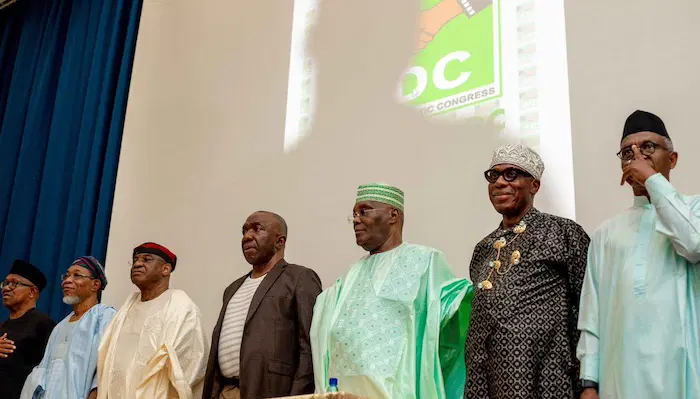The African Democratic Congress has declared it will not prioritize the contentious issue of zoning ahead of the 2027 presidential election, instead focusing on building a strong, grassroots-based political structure across Nigeria.
In an exclusive interview, the party’s Interim National Publicity Secretary, Bolaji Abdullahi, stated the ADC aims to reshape Nigeria’s political landscape by emphasizing principles, practical solutions, and people-centered governance rather than regional power-sharing arrangements.
Abdullahi explained the ADC’s strategy for 2027 would prioritize merit and national interest over traditional zoning considerations.
“As for 2027, let me be clear: we are building the party to be a serious contender, not just a participant. But we are not fixated on the presidency as though it were the only prize worth winning. That kind of thinking is part of what has led to the political dysfunction we see today,” Abdullahi said.
He emphasized the party’s commitment to building capacity at all levels of government, stating: “We are focused on building capacity across all levels so that we can contest and win governorships, Senate seats, House of Reps seats, and positions in state assemblies. Yes, the question of the presidential ticket will come, but first, we are laying the foundation.”
Abdullahi criticized the current state of Nigerian politics, which remains deeply divided along regional and ethnic lines. He argued both the ruling All Progressives Congress and opposition Peoples Democratic Party often prioritize power-sharing over competence and national unity.
“We are not fixated on power for its own sake. Our interest is not just in changing the occupants of political offices, but in transforming the way politics is done in Nigeria,” he said.
The ADC spokesman described the party as a “deliberate intervention” in Nigeria’s political system, contrasting it with the APC’s formation as a coalition driven by expediency rather than ideology.
“The ADC is a conscious response to a political vacuum. Over the past decade, what we have witnessed is the gradual erosion of meaningful opposition in Nigeria,” Abdullahi noted, adding that the party aims to offer “a bold and issue-based engagement with the ruling party.”
Abdullahi highlighted the ADC’s ongoing efforts to mobilize support at grassroots level, citing recent successes in South-West and South-East regions.
“When it comes to grassroots mobilisation, we are doing the hard work. Real political change does not begin in high offices; it starts at the grassroots,” he said.
He pointed to the party’s rally in Ekiti and momentum generated by former Osun State governor Rauf Aregbesola as evidence of growing support for ADC.
“Our emphasis now is on readiness, organisation, and credibility. The ADC is here to give Nigerians a real alternative—not just a new name, but a new vision,” Abdullahi stated.
Meanwhile, Dr. Umar Ardo, Secretary of the Coalition’s Sub-Committee on the Feasibility of Registering a New Political Party, dismissed speculation that the coalition had abandoned its application for the All Democratic Alliance.
“The coalition is anchored on a two-pronged approach. Yes, the ADC is there, but we are not abandoning our application for the registration of ADA,” Ardo clarified.
He expressed confidence that ADA would be registered soon, stating: “Our application is still undergoing the Independent National Electoral Commission’s processes and procedures. I believe by next week, we will get clarity.”
Ardo described the registration of a new party as a “bold and strategic move” to redefine Nigeria’s opposition politics and provide an authentic alternative to APC and PDP.
“It was the considered opinion of the feasibility committee, which was chaired by former Rivers State governor, Rotimi Amaechi, that registering a new political party isn’t just a tactical manoeuvre. It is a bold and strategic move that will redefine the opposition’s purpose, unite stakeholders and mobilise public sentiment in its favour,” he said.
As ADC continues its grassroots mobilisation efforts, the party’s leadership remains focused on presenting itself as a viable alternative to Nigeria’s established political parties. With its emphasis on meritocracy, ideological clarity, and community-led structures, ADC aims to challenge the status quo ahead of 2027 elections.
“A party cannot be something built on nothing. We must first build the structure, and when we get to the bridge, we will cross it,” Abdullahi concluded.
